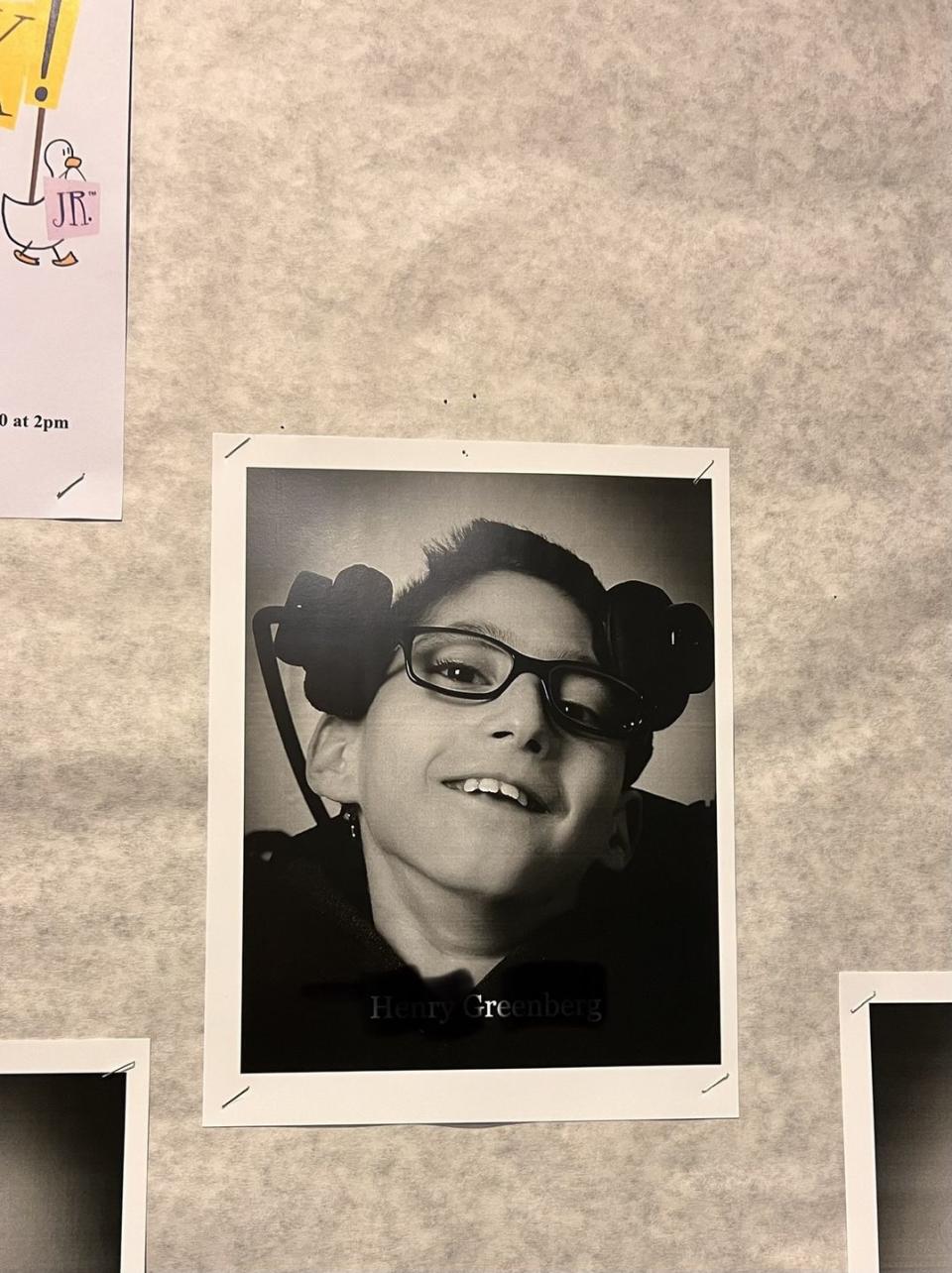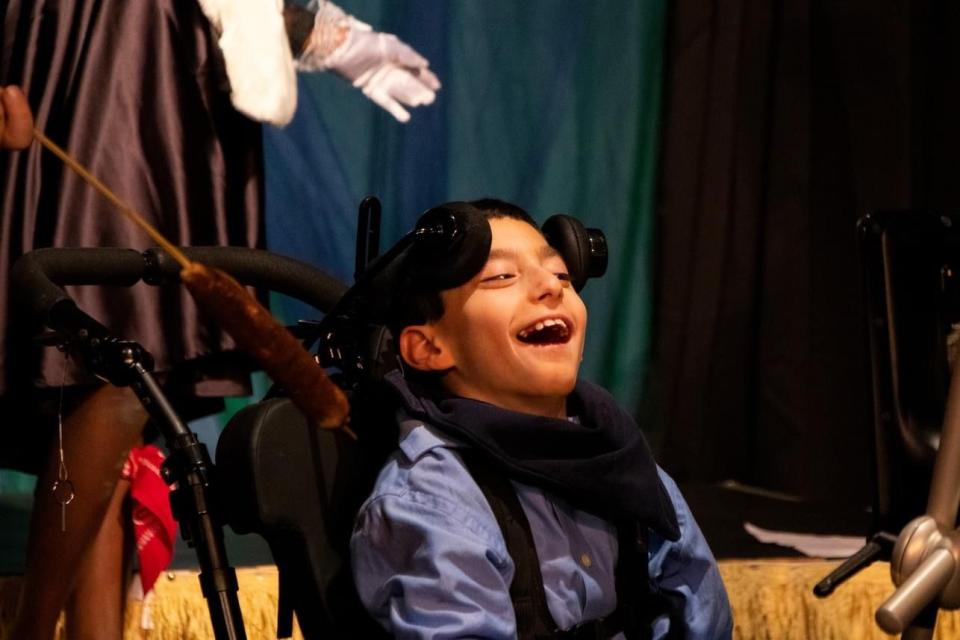My Son Can't Walk or Talk, But Being Cast in a Local Play Changed Everything for Him

This past December, I watched as my 11-year-old son Henry took center stage during a community play. Two of his co-stars spun around him and held up their arms like they were Vanna White and Henry was the answer board. Henry beamed as the audience erupted into cheers. I beamed too, as tears streamed down my cheeks.
Henry, my middle son is disabled. His list of diagnoses is long but, to keep it simple, he’s sassy and smart but unable to walk or talk.
Since the day he was born, I’ve been torn between two different worlds: one that communicates with and includes my two neurotypical children and the other that understands Henry. His early birth followed by a scary diagnosis led to extreme mother’s guilt and overwhelm. I’ve spent hours looking for doctors who understand my son’s needs or slogging through paperwork to get him the right equipment and support.
Henry has participated in hundreds of hours of therapy. He attends school in another district because our local schools can’t accommodate his needs. His school is great, but his peers, and their families, live up to an hour away, making it hard to get together. In the evening, I drive my other two children to art classes, music lessons, various sports and playdates where I sit in the car with Henry, not only because he can’t easily participate, but because, shockingly, many buildings are still not wheelchair accessible.
But the hardest part has been the social exclusion.
Kids stare because they want to understand someone who looks different. Well intentioned parents guide their children out of the way when they see us coming. They’re making room for the wheelchair, but they are also separating from us, both physically and mentally.
Despite these challenges, time spent in our home is happy. My other two children learned, by exposure and desire, to include Henry. On Saturday mornings, they crawl into his bed with an iPad to watch cartoons. They dance with him, color with him and listen to podcasts together. At home, my family is close, but as soon as we’re back in the community, life becomes exponentially more complicated.
Everything changed this past fall. After my daughter and younger son auditioned for an upcoming play, they clutched the handlebar of Henry’s wheelchair and barreled him through the side door of the theater so he could audition too.
My body tingled with excitement when I thought about dropping all three kids at an activity together. Still, as much as I’m an advocate for inclusion, I bit my lip as the door shut. Just getting Henry an accessible spot in the audience at that tiny theater had been a conversation. Could they really find a part for him? Would he tolerate seven hours a week of rehearsal?
The next morning, I received an email, “We would like to offer your three kids the following roles...” My heart swelled. Instead of Henry sitting off to the side, bored as his siblings read up on their lines, he would be part of their world.

The following Sunday, on our way to the first rehearsal, all five members of my family danced in the car, giddy that we were finally driving to the same activity. I dropped the kids off but felt weird leaving Henry behind for the first time, so I stood on my tippy toes to peer into the practice room window. Henry sat next to his sister while the other actors, kids who ranged in age from 8 to 15, read lines. A couple of kids turned and glanced, with furrowed brows, in my son’s direction. I cringed. I was used to kids staring and asking questions about the metal prompts by Henry’s head that help him sit upright or the way he waves his arms when he gets excited, but I still hadn’t found an easy way to bridge that gap in understanding.
Over the next few weeks, Henry managed well during rehearsal, but mostly, he sat quietly, off to the side. I hung around in the back of the theater to assist Henry when necessary. Eventually, things began to change. The staff had a ramp built so he could get on stage. One of the directors, who was a speech therapist, programmed Henry’s eye gaze communication device to speak his lines. The choreographer assigned kids to strategically place Henry in group numbers. Steps that allowed him to get involved in meaningful ways. Steps that encouraged the kids to work together.
Weeks passed and the cast became more familiar with my son’s body language. They depended on him to read his lines and be ready so they could wheel him to the appropriate spot on stage. Eventually, they started to root for him.
One afternoon, a 12-year-old girl lingered near Henry and quietly said to me, “Is this his first play?” I nodded. “This is his first extra-curricular activity ever.” She looked back at him surprised and said, “You’re doing great, Henry!” His eyes darted in her direction right before he flashed her a big, goofy smile.

A few weeks later, my son had a cold and had to miss rehearsal. When he got back to the theater, a couple of kids ran up to him. “Hi, Henry!” they blurted out and then bickered about who was going to push his wheelchair. Henry’s eyes sparkled and he giggled as they wheeled him away.
Finally, the cast was ready to perform for an audience. The energy in the theater was high with pre-show jitters and Henry’s infectious smile added to the excitement. During his scene, he was reserved, his body upright and calm. But as the audience laughed at his jokes when his eye gaze device read his lines, his eyes lit up, his smirk deepened and he sat taller sharing his smart personality with the audience.
The play they performed was Honk Junior, the story of the Ugly Duckling who got lost after being excluded from his community. Though Henry wasn’t the star, his scenes couldn’t have been more poignant. The Ugly Duckling searched for his identity and eventually learned to be true to himself. He finally found a place where he fit in.
After six amazing performances, the show came to an end this past December. Everyone was sad to separate, but the relationships that formed left an impression. Since then, Henry sees his play friends around town, and they excitedly wave to him. He immediately recognizes them and smiles back, the warmth radiating from his body.
Some days, we’re back to shuffling two kids to activities with Henry in tow, but the big difference now is that we know what’s possible. Henry is signed up for a weeklong theater camp with his siblings this June. Soon, they’ll all be preparing to audition for another play.
You Might Also Like


